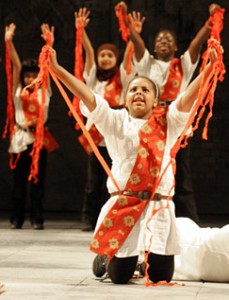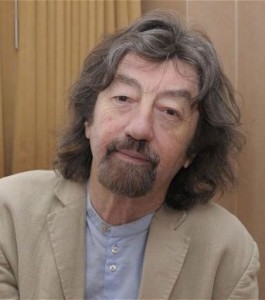 Shakespeare is universally agreed to be “a good thing” for people of all ages, and recently there have been many opinions about the best was of introducing him to children.
Shakespeare is universally agreed to be “a good thing” for people of all ages, and recently there have been many opinions about the best was of introducing him to children.
One of the good news stories of the week (and how we have needed one) is the success of Shakespeare Week, a terrific idea by the Shakespeare Birthplace Trust. The biggest barrier in schools has been the expectation that Shakespeare’s going to be boring. It’s to try to counter this idea that Shakespeare Week has been set up. Running from 17-23 March, the SBT is coordinating the efforts of “schools, theatres, historic sites, museums, galleries, cinemas and libraries all over the UK. Together, we’re giving every child the chance to be inspired by Shakespeare’s stories, language and heritage.”
In the planning for around a year, the idea has proved a huge success:
Teachers in more than 2,500 primary schools across the UK have embraced the opportunity to introduce Shakespeare into their classrooms. To date more than 20,000 free resources have been downloaded from the Shakespeare Week website for use in every subject, from scientific experiments and nature studies, to preparing a Tudor banquet, film-making and acting out scenes from one of the bard’s plays, the most popular being Macbeth.
A slightly different view has been put forward by Mark Powell of Salisbury Playhouse in an article suggesting we should “Kill Bill“. He’s actually identifying exactly the same problem the SBT is trying to address, that teenagers find Shakespeare boring unless they begin with a positive experience. Coming from a theatre background, Powell sees theatre skills as the key. And he makes some good points. Outings to theatres have become too costly and too complicated to administer, so children stay in school. To be successful, classroom teaching needs to be given by people with the necessary drama teaching skills, rather than by teachers of English who tend to pick apart the words. He suggests:
Let’s give English teachers a break, give drama teachers a boost and give young people an important sense of equality. You don’t need an expensive education to understand the words, but you do need the luxury of time, space and specialism to put his words on their feet and try them out.
Powell echoes the words and sentiments of the RSC’s Stand Up for Shakespeare campaign that launched in 2008. 15000 people signed up to their manifesto, the aims of which were that children should do it on their feet, see it live, and start it earlier.
In September 2013 Gregory Doran, RSC Artistic Director, was interviewed in The Spectator. He repeatedly focused on the need to involve young people, as the interviewer puts it to get Shakespeare “into the veins of the UK’s youth”. As well as using the RSC’s energetic Education Department to involve children in Stand Up for Shakespeare, Doran hopes the RSC’s main theatre offerings will appeal to them. “What I really want to do above all is generate some excitement”, he says, and his method of doing this it to bring in top-class actors who really want to play the roles, adding some glamour and making the RSC a place where audiences can expect to see great performances. The current six-year project to produce each of Shakespeare’s plays will encourage children at senior school to “collect” all the productions. Doran himself got the Shakespeare bug by attending a production in Stratford as a schoolboy and he hasn’t forgotten that if you catch them early, you may get them for life.
Other recent articles have included this one by teacher Genevieve White who explains the commonest reasons given by teachers for not wanting to teach Shakespeare – and why they’re wrong. As a teacher herself, and a reluctant Shakespeare learner, she includes this account of her introduction to Shakespeare at school:
I can still vividly remember the crushing boredom I experienced reading The Merchant of Venice as a fifteen-year-old high-school student. My classmates and I took it in turns to read aloud in a mumbled monotone, while our teacher dozed in her chair (occasionally waking up to summarise in simplified English). It was an uninspiring introduction to Shakespeare’s work. Sadly, I suspect it was not an unusual one.
And actor and educator Ben Crystal gives his opinion in a recent article about some of the best ways of involving children in Shakespeare.
All these people agree it’s worth the struggle of introducing Shakespeare to the young, not least because his work continues to speak to people throughout their lives. Eminent director Trevor Nunn is another person who came from a working-class background. In this Daily Telegraph interview he stated that Shakespeare is more relevant than the Bible. “Shakespeare has more wisdom and insight about our lives, about how to live and how not to live, how to forgive and how to understand our fellow creatures, than any religious tract.”
The statement is reminiscent of John Lennon’s famous 1966 line “We’re more popular than Jesus now”, which in the USA provoked the public burning of Beatles records and saw members of the Ku Klux Klan picketing Beatles’ concerts. Many people will disagree with Trevor Nunn, but are unlikely to be so extreme in their reactions. After all, Shakespeare often used the Bible for inspiration.




Sylvia, Woman’s Hour had an excellent piece on Wednesday for Shakespeare Week on the RSC’s production of The Taming of the Shrew currently touring to schools (listen again at http://www.bbc.co.uk/programmes/p01vsmpd). Last month the programme also covered the Shakespeare Schools Festival (listen again at http://www.bbc.co.uk/programmes/p01s2cfn) – it included a 10 year old girl enthusiastically getting stuck into “Once more unto the breach…” followed by a discussion with the festival organiser and a drama teacher from one of the schools involved.